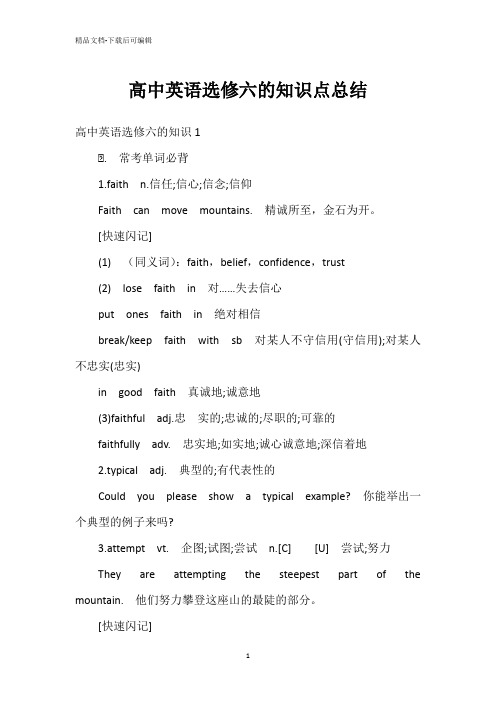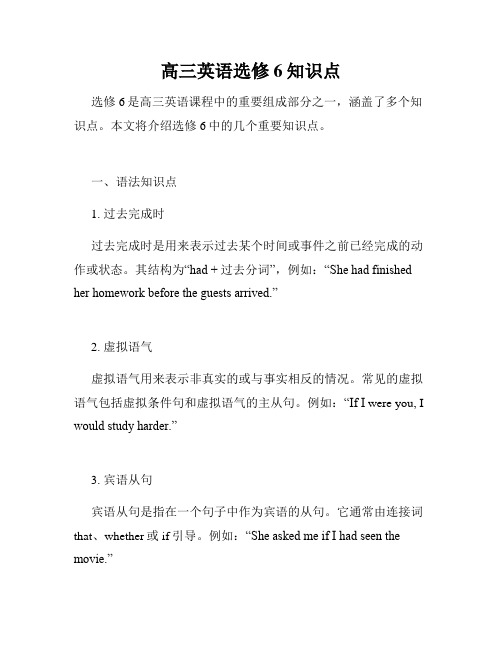高中英语选修六的知识点总结
高中英语人教版选修6关键知识提炼

高中英语人教版选修6关键知识提炼
1. 文化差异
- 英语人教版选修6涉及到了一些国际文化差异的话题,例如多元文化、国际交往等。
- 学生们需要理解和尊重不同文化之间的差异,培养跨文化意识和交际能力。
2. 文学与艺术
- 教材中包含了一些经典文学作品和艺术创作,如莎士比亚的戏剧和印象派绘画。
- 学生们应该学会欣赏文学和艺术作品,并能够运用英语描述和解读它们。
3. 环境保护
- 选修6中关注了环境保护的重要性,涉及到了气候变化、可持续发展等话题。
- 学生们应该了解环境问题,并积极参与到环保行动中去。
4. 社会问题
- 教材中还涉及了一些社会问题,如青少年犯罪、贫困等。
- 学生们需要思考和讨论这些问题,并提出解决方案。
5. 学术写作
- 选修6着重培养学生的学术写作能力,包括论述和议论文的写作技巧。
- 学生们需要学会构思、组织和表达自己的观点,并能够用正确的英语表达出来。
以上是高中英语人教版选修6的关键知识提炼,希望对您有帮助。
英语选修六知识点总结

英语选修六知识点总结Unit 1: Cultural relics1. What are the cultural relics?Cultural relics refer to the remains of human activities that have historical, scientific, artistic or aesthetic value. They can reflect the social life, historical activities and technological achievements of the past and show the characteristics of the times and regions in which they were produced.2. Categories of cultural relicsCultural relics can be divided into tangible cultural relics and intangible cultural relics. Tangible cultural relics include ancient buildings, artifacts, fossils, ruins, paintings and calligraphy, while intangible cultural relics mainly refer to the traditional cultural heritage and customs, such as folk music, dance, drama, festival activities and traditional craftsmanship.3. The importance of protecting cultural relicsCultural relics are precious resources for humans to explore history, study culture and promote the development of society. Moreover, the protection of cultural relics is an important measure to pass on the national cultural heritage, promote cultural exchanges and enhance the cultural soft power of a country.4. Famous cultural relicsThere are numerous famous cultural relics around the world, such as the Great Wall and the Terracotta Warriors in China, the Pyramids of Egypt, the Parthenon in Greece, the Colosseum in Italy, and the Taj Mahal in India.Unit 2: Civil rights1. What are civil rights?Civil rights refer to the basic rights and freedoms that are guaranteed to every citizen by law. These rights include the right to life, liberty, property, and the pursuit of happiness, as well as freedom of expression, assembly, and religion.2. The development of civil rightsThe idea of civil rights evolved over time and has been shaped by various social, political and historical factors. The struggle for civil rights has been a central theme in the history of many countries, and has led to significant changes in laws and social policies.3. Civil rights movementsThroughout history, there have been numerous civil rights movements that have sought to secure and expand the rights and freedoms of marginalized groups, such as women, racial minorities, LGBTQ communities, and people with disabilities. These movements have played a crucial role in advancing the principles of equality and justice in society.4. Current civil rights issuesIn today's world, civil rights continue to be a significant issue, with ongoing debates and challenges related to racial discrimination, gender equality, LGBTQ rights, immigrant rights, and the protection of human rights in the digital age.Unit 3: Language1. The nature of languageLanguage is a system of communication that uses symbols, such as words and gestures, to convey meaning. It is a uniquely human ability and serves as a fundamental tool for expressing thoughts, emotions, and ideas.2. The functions of languageLanguage serves several functions, including expressing thoughts, emotions, and desires, conveying information, establishing and maintaining social relationships, and preserving cultural traditions.3. The characteristics of languageLanguage has several key characteristics, such as arbitrariness, duality, productivity, displacement, and cultural transmission, which distinguish it from other forms of communication and contribute to its complexity and richness.4. The diversity of languagesThere are thousands of languages spoken around the world, each with its own unique structure, vocabulary, and cultural significance. Language diversity reflects the rich tapestry of human experience and highlights the importance of linguistic diversity in preserving the cultural heritage of different communities.In conclusion, the study of cultural relics, civil rights, and language in English 6 provides valuable insights into the richness and complexity of human experience. These topics offer important opportunities for students to explore history, society, and culture, and to develop a deeper understanding of the world around them. By engaging with these knowledge points, students can gain a deeper appreciation for the diversity of human experience and the importance of protecting and preserving our shared cultural heritage.。
选修六英语知识点归纳总结

选修六英语知识点归纳总结选修六英语课程是高中阶段的一门英语课程,它主要针对学生的英语学习能力和应用能力进行培养和提升。
该课程的重点在于拓宽学生的英语知识面,提高学生的语言运用能力,并通过阅读与写作的训练来提高学生的综合素养。
以下是选修六英语课程的知识点总结。
1. 阅读技巧:选修六英语课程注重培养学生的阅读能力,包括理解文章主旨、提取关键信息、推理判断等技巧。
学生需要通过大量的阅读练习来积累词汇量和语言表达能力,提高阅读速度和准确性。
2. 写作技巧:选修六英语课程还注重培养学生的写作能力,包括写作结构、篇章连贯、语言表达等方面的技巧。
学生需要通过模仿与实践,掌握不同文体(如记叙文、议论文等)的写作要点,并提高语言的准确性和表达的流畅性。
3. 词汇扩展:选修六英语课程会引导学生通过各种途径扩大词汇量,包括通过背单词、阅读英文文章、听力训练等。
学生需要积极主动地进行词汇的积累,并注意词汇的正确使用。
4. 语法知识:选修六英语课程也会涉及一定的语法知识,包括时态、语态、从句、非谓语动词等。
学生需要掌握这些基础语法知识,并能够在写作和阅读中正确运用。
5. 听力训练:选修六英语课程注重培养学生的听力能力,包括听取信息、理解对话、听写等技巧。
学生需要通过大量的听力材料进行训练,提高听力的准确性和听取关键信息的能力。
6. 口语表达:选修六英语课程也会培养学生的口语表达能力,包括对话、演讲、辩论等形式的口语训练。
学生需要通过与同学的交流、角色扮演等活动来提高口语表达的流利度和准确性。
7. 学术写作:选修六英语课程会引导学生进行学术写作训练,包括文献综述、实验报告、研究论文等形式的写作。
学生需要掌握学术写作的特点和要求,提高逻辑思维能力和文献搜集整理能力。
8. 阅读理解:选修六英语课程注重培养学生的阅读理解能力,包括理解文章的主旨、推理判断作者观点等技巧。
学生需要通过不同类型的阅读材料进行训练,提高阅读理解的准确性和判断能力。
高中英语选修六知识点

高中英语选修六知识点许多国家在基础教育发展战略中,都把英语教育作为公民素质教育的重要组成部分,并将其摆在突出的地位。
接下来店铺为你整理了高中英语选修六知识点,一起来看看吧。
高中英语选修六知识点:词语abuse n. & vt. 滥用;虐待stress n. 压力;重音 vt. 加压力于;使紧张ban vt. 禁止;取缔 n. 禁令;谴责due adj. 欠款的;预定的;到期的due to 由于……automatic adj. 无意识的;自动的mental adj. 精神的;智力的effect n. 结果;效力strengthen vt. 加强;巩固;使坚强 vi. 变强decide on 对……作出决定feel like (doing) 想要(做)……desperate adj.绝望的,拼命的disappointed adj. 失望的;沮丧的ashamed adj. 感到惭愧或羞耻的in spite of 不顾;不管take risks (a risk) 冒险get into 陷入;染上(坏习惯)at risk 处境危险;遭受危险awkward adj. 局促不安的;笨拙的come about 发生;造成subscribe to 同意;订购quantity n. 量;数量quantities of 大量的tend vi. 趋向;易于;照顾 vt. 照顾;护理go up 上升;增长;升起result in 导致oppose vt. 反对;反抗;与(某人)较量opposed adj. 反对的;对立的be opposed to 反对……state vt. 陈述;说明range n. 种类;范围even if 即使keep on 继续glance vi. 看一下;扫视 n. 一瞥steady adj. 平稳的;持续的;稳固的steadily adv. 平稳地;持续地tendency n. 倾向;趋势widespread adj. 分布广的;普遍的on the whold 大体上;基本上average adj. 平均的on behalf of 代表……一方;作为……的代言人put up with 忍受;容忍so long as 只要an so on 等等circumstance n. 环境;情况longside adv.在旁边;沿着边 prep. 在……旁边;沿着……的边appoint vt. 任命;委派wave n. 波浪;波涛 vi. 波动;起伏;挥手absolute adj. 绝对的;完全的absolutely adv. 绝对地;完全地suit n. 一套外衣;套装 vt. 适合;使适宜make one’s way 前往potential n. 潜在性;可能性;潜能 adj. 可能的;潜在的actual adj. 实在的;实际的shoot (shot, shot) vt. 射中;射伤anxious adj. 忧虑的;不安的anxiety n. 担心;焦虑;渴望panic (panicked, panicked) vi. & vt. 惊慌 n. 惊慌;恐慌glance through 匆匆看一遍vary from…to… 由……到……不等guarantee vt. 保证;担保高中英语选修六语法知识点一、“it”的用法1. it可指代前文提到的事物;替代前文中的内容;指代一位性别不明的小孩或未知的人;指代未指明但谈话双方都知道的那件事;指代时间、天气、气候、距离等自然现象。
(完整word版)人教版高中英语选修六知识点总结

(完整word版)人教版高中英语选修六知识点总结Unit 1I词汇及结构1. would rather do sth情愿做….would rather sb did sth情愿sb做…情愿做….而不愿意做…:would rather do sth than do sth= would do sth rather than do sth= prefer to do sth rather than do sth= prefer doing sth to doing sthI would rather stay at home today. 我今天宁愿待在家里。
I would rather you came here tomorrow. 我宁愿你明天来。
I would rather you hadn’t told me about it yesterday.我宁愿你昨天没有告诉我关于它。
2.faith n. 信任,信仰break one's faith with sb. 对某人不守信用keep faith with 忠于信仰; 守信I kept faith with him.我信守了对他的诺言。
He who loses faith, loses all.失去信心的人, 失去所有。
have faith in 相信, 信任in good faith 老实地;诚恳地faithful adj. 忠诚的,可靠的3.As there are so many different styles of Western art , it would be impossible to describe all of them in such a short text.so+adj+a(an)+(单数可数) (+that…)so many/few +n (复数) (+ that…)so much/little (不可数) (+that…)such+adj.+n.(不可数)/ n (复数)eg.1) The book is ________interesting that Iwant to read it again.2) It was ________a cold day that the ice inthe river was nearly two feet thick.3) It was _______cold a day that the ice inthe river was nearly two feet thick.4) There are _______many mistakes in yourcomposition that I can’t understand it.5) He has made ________rapid progress that he got the first in the exam.6) _______that Maric was able to set up new branches elsewhere.(07陕西)A. So successful her business wasB. So successful was her businessC. So her business was successfulD. So was her successful businessB4.consequently adv. 所以,因此I overslept and ____ I was late for work. 我睡过头了,所以我上班迟到了。
高中英语选修六知识点总结

高中英语选修六知识点总结高中英语选修六知识点总结
高中英语选修六是一门非常重要的英语课程,给学生们带来了许多新知识和挑战。
选修六主要是围绕着英语文学、文化和历史展开内容的,需要我们不仅要学会阅读和理解英语文章,还要学习写作和听力技能。
以下是关于选修六的一些重要知识点总结:
1.文学知识
选修六的文学知识主要涉及英美文学史、文学流派和文学作品分析,需要我们熟悉不同文学时期的文学特点,掌握文学流派和文学作品的阅读技巧。
2.文化知识
选修六的文化知识涉及到英、美、加等国家的历史、文化、政治、社会等方面,需要我们熟悉不同国家或地区的文化差异,增强跨文化交流的能力。
3.写作技巧
选修六的写作技巧主要是指英语写作和翻译,需要我们掌握英语写作中的基本句型、段落结构和篇章结构,同时还需要了解翻译的基本技巧和方法。
4.阅读理解
选修六的阅读理解主要是针对英美文学作品进行的,需要我们在阅读时了解作者的写作风格、主题和意义等方面,同时也需要我们熟练运用阅读技巧,如猜词、推理和细节查找等。
5.听力技能
选修六的听力技能主要是指听力理解和口语表达,需要我们熟悉英语听力考试中的常见题型,如听力短对话、长对话、听力材料等,并且要了解常用的口语表达方式。
6.英语考试技巧
在英语考试中,有一些常见的技巧可以帮助我们更好地完成试卷,如肢体语言和眼神交流,同时还需要我们熟练掌握强化记忆和归纳总结等方法。
总体来说,选修六是一门需要我们在多个方面进行学习的英语课程,需要我们充分掌握各种技巧和方法,才能取得优异的成绩。
高中英语选修六的知识点总结

高中英语选修六的知识点总结高中英语选修六的知识1Ⅰ. 常考单词必背1.faith n.信任;信心;信念;信仰Faith can move mountains. 精诚所至,金石为开。
[快速闪记](1) (同义词):faith,belief,confidence,trust(2) lose faith in 对……失去信心put ones faith in 绝对相信break/keep faith with sb 对某人不守信用(守信用);对某人不忠实(忠实)in good faith 真诚地;诚意地(3)faithful adj.忠实的;忠诚的;尽职的;可靠的faithfully adv. 忠实地;如实地;诚心诚意地;深信着地2.typical adj. 典型的;有代表性的Could you please show a typical example? 你能举出一个典型的例子来吗?3.attempt vt. 企图;试图;尝试n.[C] [U] 尝试;努力They are attempting the steepest part of the mountain. 他们努力攀登这座山的最陡的部分。
[快速闪记](1)attempt to do/doing... 试图做……attempt at sth 试图做某事(2)make an attempt to do/at (doing) sth 试图做某事in an attempt to do sth 试图做某事at ones first attempt 某人第一次尝试(3)attempted adj. 未遂的;未成功的4.predict vt. 预言;预告;预料;预计Middle-aged adults (age 40 to 64) more accurately predicted how they would feel in the future. 中年人可以更加精确地预测他们的未来。
高三英语选修6知识点

高三英语选修6知识点选修6是高三英语课程中的重要组成部分之一,涵盖了多个知识点。
本文将介绍选修6中的几个重要知识点。
一、语法知识点1. 过去完成时过去完成时是用来表示过去某个时间或事件之前已经完成的动作或状态。
其结构为“had + 过去分词”,例如:“She had finished her homework before the guests arrived.”2. 虚拟语气虚拟语气用来表示非真实的或与事实相反的情况。
常见的虚拟语气包括虚拟条件句和虚拟语气的主从句。
例如:“If I were you, I would study harder.”3. 宾语从句宾语从句是指在一个句子中作为宾语的从句。
它通常由连接词that、whether或if引导。
例如:“She asked me if I had seen the movie.”二、阅读技巧知识点1. 推断通过阅读理解文章中的线索并结合常识,我们可以推断出一些未明确提及的信息。
在进行推断时,要注意根据文章所提供的信息进行逻辑推理。
2. 判断在阅读理解中,经常需要进行判断题的选择。
为了正确判断,需要仔细阅读文章,理解文章的主旨和细节,并根据文章提供的线索做出合理的判断。
三、写作技巧知识点1. 议论文写作技巧议论文是一种需要表达自己观点的文章形式。
在写议论文时,要明确观点,并用事实、数据、论据等支持观点。
同时要注意语言表达的准确性和逻辑性。
2. 段落结构在写作中,每个段落应该有一个明确的主题句,用来概括段落的主要内容。
同时,段落之间应该有适当的过渡句,使文章结构更加紧密。
四、听力技巧知识点1. 注意听力材料的细节信息在听力理解中,细节信息常常是解答问题的关键。
细心听取材料中的具体细节,例如数字、时间、地点等,以便更好地理解和回答问题。
2. 多练习听力题型高考英语听力部分的题型多种多样,包括听力短文填空、听力选择题等。
为了熟悉和掌握各种题型的解题方法,平时要多进行听力练习。
- 1、下载文档前请自行甄别文档内容的完整性,平台不提供额外的编辑、内容补充、找答案等附加服务。
- 2、"仅部分预览"的文档,不可在线预览部分如存在完整性等问题,可反馈申请退款(可完整预览的文档不适用该条件!)。
- 3、如文档侵犯您的权益,请联系客服反馈,我们会尽快为您处理(人工客服工作时间:9:00-18:30)。
高中英语选修六的知识点总结
高中英语选修六的知识点总结
高中英语选修六是一个相对难度较大的课程,其中包含了许多重要的知识点。
下面将对选修六的知识点进行总结,帮助学习者更好地准备和学习这一课程。
1. Literature
该部分主要内容包括英美文学史、文学流派、典籍简介等。
在英美文学史方面,要了解各个时期的文学特点、代表作品和作者。
在文学流派方面,要熟悉不同流派的特点、代表作品和作家,并能够运用相关的术语来进行分析和解读。
典籍方面则要熟悉一些重要的名著,如莎士比亚的戏剧、爱伦•坡的恐怖
小说等。
2. Grammar
语法是英语学习的基石,在选修六中也是非常重要的部分。
这一部分内容包括词汇、句子结构、语态、时态、虚拟语气、倒装句等。
在学习这些知识点时,需要注意细节,特别是注意使用时的注意事项。
3. Writing
写作是英语学习的重要部分之一,它分为两个方面:一是文章结构的组织、二是语言的表达。
在学习文章结构方面,要熟悉各种不同类型的文章结构,比如议论文、说明文、议论文
等。
在语言表达方面,要注意字词的准确性、词语搭配和句子结构。
4. Listening and Speaking
听力和口语是语言能力的体现。
在选修六中,听力和口语的训练主要集中在理解听力材料和能够流利地表达自己的观点。
要锻炼听力和口语能力,可以通过听录音、看电视、参加英语角等方式来进行训练。
5. Reading and Comprehension
阅读理解是英语学习的重要部分之一,它包括阅读理解和阅读技巧两个方面。
在阅读理解方面,要提高自己理解能力,能够从文章中获取信息、理解文章的意思和推测信息。
在阅读技巧方面,要掌握一些阅读技巧,在阅读过程中快速获取信息。
以上就是高中英语选修六的知识点总结,希望对大家有所帮助。
要想学好选修六,需要不断地练习和提高自己的英语实力,坚持不懈,定能取得好成绩。
